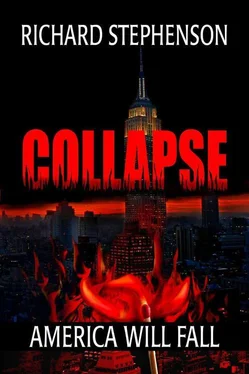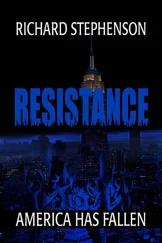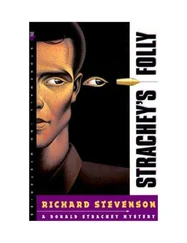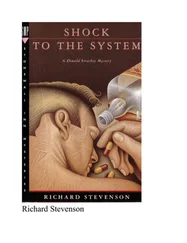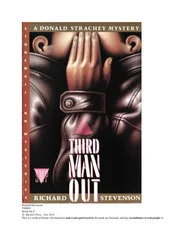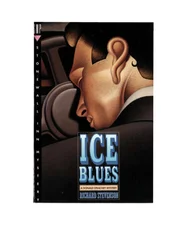The employees that could make it out of the store ran and ran until they looked over their shoulders and couldn’t see Wal-Mart in the distance. The unlucky employees that didn’t make it out were killed by the mob, angry at them for being so selfish and hoarding everything for themselves.
General Manager Chester Stephens held up both hands and managed to stop the angry mob from entering. They thought he was surrendering his gold mine. When Chester began demanding that they leave or face prosecution, the crowd replied by beating the man to death. Chester Stephens died a loyal and faithful employee of Wal-Mart. His last thought was of what he would say to Sam Walton when he greeted him at the gates of heaven.
The Kissimmee Walmart Supercenter had fallen; in less than a day its shelves were almost bare. Benjamin Black and his renegades took what they wanted and quickly moved on to another target.
William Sanderson, Harvard MBA, and recipient of the Merrill Lynch Man of the Year Award, awoke in his cardboard home in the Central Park Obama-Camp. Having absolutely no outdoorsman skills to speak of, William had no choice but to learn how to be a successful homeless man. His first cardboard home was not able to repel the elements. He awoke one night to find his domicile a sopping mess, collapsing on top of him and his family. He knew he had to do better. He quickly constructed a new home and spent over a week adding to the makeshift structure. At sunrise the next morning, William cleaned up the sopping cardboard structure and instructed his wife to protect the children. He ventured out into the violent city of New York to scavenge building materials for his home. He returned just before sunset that night with a shopping cart stacked to the point of toppling over and greeted his wife with a kiss. Lindsay had just finished feeding the children a bountiful feast she had procured from the trashcans behind a local deli. She offered William his portion of the meal. William picked a few bites and gave the rest to his children.
William had been one of the lucky ones when The Second Great Depression came to take his four thousand square foot home along with all his cars and anything else of value. William considered himself lucky because he was a born survivor. He had grown up in abject poverty in Brooklyn. His father abandoned his mother and younger siblings, and William had to immediately assume the role of the family’s breadwinner and surrogate father figure. He was a star baseball player, attending Harvard on a scholarship. He worked two jobs to support himself and continued to send money home to his mother. He continued his studies and obtained his MBA. William was immediately picked up by Merrill Lynch and made a fortune investing money for both himself and his wealthy clients. He married and had two kids; his family wanted for nothing. William made so much money that his grandchildren probably wouldn’t be able to spend it all.
When the American economy came crashing down and soon after, the economies of most countries across the globe, he lost everything. He managed to stay in the fight longer than the men who threw themselves from the high-rises along Wall Street. Most of those men had no idea on their way down that their idea was far from original. If they had taken a few more history courses in business school, they would have known that during The First Great Depression over a century before, the idea had been executed many times.
William arrived back at the sprawling Obama-Camp that covered most of Central Park and unpacked the contents of the shopping cart. The term “Obama-Camp” was meant as the worst possible insult to the former president. It was a throwback to the “Hoovervilles” built during the First Great Depression meant to insult President Hoover. President Obama wasn’t even in office when the camps sprouted up all around the country. The blame was placed on his shoulders due to the massive debt he piled on the American economy during his time in the Oval Office. Any time a camera was placed on them, the Democrats would point out that the nation’s first black president only inherited an already failing economy from President Bush. Fox News even made a logo for the camps depicting a starving, crying family cowering at the feet of an imposing and menacing looking Obama. It didn’t take long for the rest of the media world to follow suit, and the name stuck through two administrations after Obama left office.
William set about constructing his new home. He had managed to find some old pallets and broke them up into lumber. Also in his cart were old tarps, cordage from wire and rope, dirty blankets, and the most prized possession – a bundle of three rolls of duct tape. Duct tape had a thousand uses, and William knew he had a valuable asset. He took one of the rolls and buried it in a hole in the floor of his new home. With the help of his wife and children, they had not built an Obama-House; they had built an Obama-Mansion.
William never once gave his children the indication that anything was wrong. He simply told his five and seven year olds that they were leaving their house to go camping in Central Park. The people out there in the park really know how to live, he told them. They have Mother Nature to look at all day, and they could play as much as they wanted in what was left of the Park. We get to look up at the stars at night. Look! Over there — that’s the Big Dipper! His children had never been happier. They would spend more time with their father in the next year than they had the previous short years of their young lives combined. William cried when his little girl asked him if they could live in Central Park forever. She was having so much fun that she didn’t want to go back to the house to which William no longer had the keys. If children have loving, nurturing parents, they would be happy to live anywhere.
At first William was terrified to walk the streets of New York for fear of being mocked or even attacked for being a dirty homeless man. Much to his surprise, he realized that if you were homeless, you might as well be invisible. No one so much as looked at him or acknowledged that he was worthy of the dignity that came with being a human being. He thought back in shame to the many years he walked the busy streets in the financial district. He would turn his line of sight to pretend to look at something else or even pretended to talk on his cell phone waiting for the light to change rather than acknowledge that another of God’s creatures was asking for his charity.
One morning after warming up by an Obama-Furnace (a large metal drum with holes near the top for lighting fires) he returned to his one room home and told his wife that he would be gone for most of the day looking for food and supplies. This was partially true. He didn’t know how to tell Lindsay that he was very, very ill. He spent the previous week running a high fever and couldn’t stop coughing. William told her it was nothing, just allergies from the seasons changing. He set off to wait for what he knew would be the entire day at the Free-Clinic at the edge of Central Park. After finally being treated and given some medication to take with him, he stepped out of the medical tent to find the sun already setting. Lindsay was going to be very worried. She had probably told their neighbors he had not come home, and he was sure that his friends were out searching the park for him.
William made his way back to his wife and hugged and kissed her. Lindsay was crying and could not deliver the angry scolding she had rehearsed. William made up some excuse about getting lost and not being able to get directions from anyone. The excuse was believable since most citizens wouldn’t look at a homeless person if they were on fire.
William took his medication in secret for the next few days and managed to recover. He was determined to keep the illness from Lindsay, he didn’t want her to worry. One morning he asked his neighbor to watch over his house so he and his family could go for a stroll and get some fresh air. While his kids ventured off within eyesight to run and play, he held his wife’s hand and looked at the skyline of New York. He tried not to think back to the days of his old life of comfort and excess. Those memories served him no good; it was from another life that needed to be forgotten. He needed to look to the future, however bleak and depressing. He had to provide for his children.
Читать дальше
